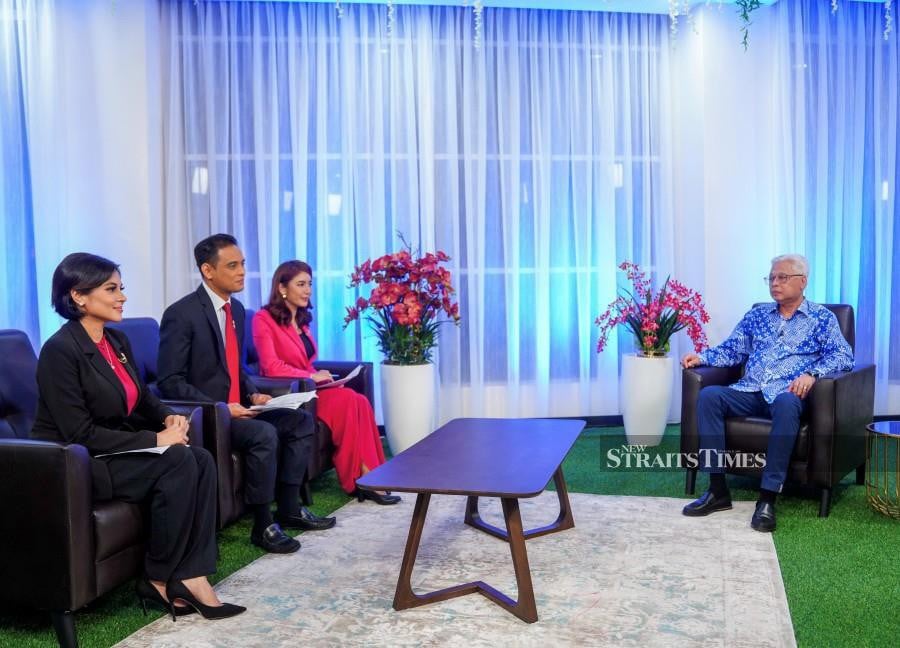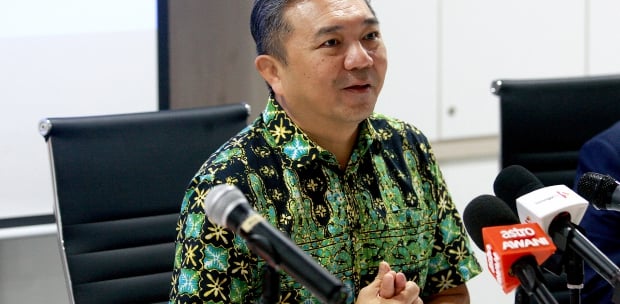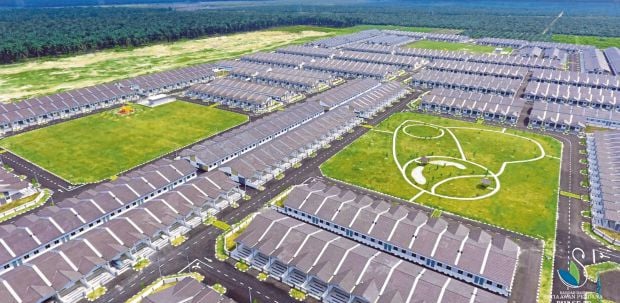KUALA LUMPUR: Caretaker prime minister Datuk Seri Ismail Sabri Yaakob tonight laid bare his thoughts on issues affecting Barisan Nasional's 15th General Election (GE15) campaign and beyond.
Speaking on the "Ruang Bicara Khas: Stability and Prosperity" programme aired on several television stations tonight, the Umno vice-president discussed a myriad of topics including BN's strategy of fielding candidates in opposition strongholds, what the coalition can offer voters, as well as whether it would be open to entering a collaboration with Pakatan Harapan if it fails to secure a dominant majority in the polls.
The following is the full text of his interview.
Question: What are your thoughts about the campaigning for the 15th General Election (GE15)?
Answer: Alhamdulillah, based on the reports I have received from the police, the campaigning is proceeding smoothly. There are no major issues such as provocation or extreme violence. This is unlike nomination day on Nov 5, when there was some commotion, but as of today, nothing serious. I hope this harmony will be maintained until voting day on Nov 19.
Q: After several days of campaigning, do you see any signs that Barisan Nasional (BN) will win? What are the contributing factors to this change of support for BN?
A: Of course, I am confident based on mood, such as in the Bera parliamentary constituency, where I have been all day. I also had time to go to Johor and Alor Gajah in Melaka. I see that the mood of the voters have changed significantly compared to the 14th General Election. During GE14, we could sense from the beginning (that the mood was unusual) but this time, it feels different. This is true not just among the Malays or the urban voters, but also non-Malays especially the Chinese who have shown much better acceptance than in GE14. If you ask whether I'm sure that I can win? Of course I will answer confidently.
Q: There are quarters alleging that not all groups can enjoy the initiatives that you have introduced and implemented. How far is this true?
A: I feel that the 2023 Budget is the best. Firstly, this is a big budget, biggest in history with an allocation of RM372.3 billion. In terms of development (the government has allocated) RM95 billion and this budget encompasses all Keluarga Malaysia in urban and rural areas, the B40, M40, and even T20 groups, as well as farmers, fishermen, breeders, MSMEs (micro, small and medium enterprises) businesses, even those involved in international business, so in terms of budget, it is holistic.
Additionally, we also gave out the largest subsidy in history at RM77.7 billion this year. Those who enjoy the subsidies are not just those in the B40 category, but everyone, including the T20.
Everyone gets to enjoy the fuel subsidy and electricity subsidy, whether you are rich or poor. Before this we would focus on the B40, this time we also pay attention to the M40 and even the T20. All in, everyone can benefit from what we have presented.
Q: There are four prime minister candidates being presented by parties contesting in GE15. Why should the people vote for you?
A: They can look at what I have done. You can already see the kind of administration I would lead after the elections based on (my time as prime minister) before the elections. I took over the government at a very difficult time. Covid-19 cases were at 24,000 daily with hundreds of deaths each day.
Beds in the intensive care units (ICU) were not enough, the economy was in a very bad state because our economic sectors had been closed almost completely. The power struggle in politics led to the prime minister being changed twice for no reason.
But try and look at my achievements in the last one year and four months. In terms of Covid-19, from 24,000 (cases), we became one of the best countries to control Covid-19 when our vaccination rates were among the highest compared to other.
Our economy was indeed in bad condition at the time, but recently, Bank Negara Malaysia declared that our gross domestic product (GDP) for the third quarter was at 14.2 per cent, making our country one of the best in terms of GDP. From five per cent in the first quarter to 8.9 per cent in the second quarter, and improved to 14.2 per cent in the third quarter this year.
In terms of unemployment, it went down to 3.6 per cent, and if it is less than four per cent, we are considered to be in full employment. This means we have also reduced unemployment.
The same goes for foreign direct investments, foreign investments, trade, and so on. Today, we have proven that wholesale and retail sales have increased significantly. So from an economic point of view, we have also been able to resolve it compared to other countries.
Q: What else can you offer the voters?
A: I took on (the role as prime minister) when the country was unstable, I also managed to stabilise the country's politics. Never in our country's history has it happened before where the ruling government can sit together with the opposition and sign a memorandum of understanding to establish a 'ceasefire' in the country, which in turn led to political stability.
Even the Malaysia Agreement 1963 (MA63) and the amendment to the constitution were approved with the support of all parties unanimously.
The anti party-hopping law was previously never passed, even though we have talked about jumping parties for a long time. When I was prime minister, it was passed so calmly without any rejection from anyone. In the end, the country's politics was stabilised.
Compared to the rest, Datuk Seri Anwar Ibrahim has never been able to prove his success as prime minister. Tun Dr Mahathir Mohamad who led for 22 months was toppled by his own coalition party.
After that, Tan Sri Muhyiddin Yassin, after 18 months, was also toppled. Even though I (had led the country) for 15 months, the government was not overturned by anyone. So what I'm trying to say is, if during that period I could solve many issues, try giving me five years. There are many more things that I can do.
Q: Entering the second week of campaigning, how will you restore confidence in BN in this election?
A: I believe that in terms of campaigning, it will become more intense. I am worried and afraid that more personal issues will be raised. But at the party level, we do not focus on these personal issues, these character assassinations are not a point for us to use as campaign materials.
We are more focused on the "product" and what we can offer to the people. Our manifesto is far better than the manifesto of other parties because our manifesto is largely part of the 2023 Budget that was tabled in Dewan Rakyat on Oct 7.
I have always said that when we tabled our budget as our manifesto, it is not an empty promise because it has already been budgeted for. All that we have presented already has its allocated funds for it to be implemented, only pending its approval.
We don't promise the moon and the stars, but we are based on real promises because everything that we have planned has its finances. Our strategy is more about presenting our offers to the people, 'selling" our products but not discrediting the products of others.
I hope the people can accept the way we (campaign) instead of personal attacks.
Q: Many big names were dropped from this election. What was your reaction when you found out?
A: I felt sad and a bit disappointed. Let me be frank. They are my close friends. They are my ministers, deputy ministers. I am indeed quite upset and sad, however, it is more important not to cry over their departure to the point that we cannot work because the victory of our party in the GE is more important.
So I consoled my friends who were affected and told them that our journey hasn't ended. We are fighting to achieve victory, from a party that lost in GE14 to being fortunate that we are able to gain control of the government, not through elections, but through strategies that everyone now knows. What's vital is that the party regains control of government, and we want to be the dominant party. If we cry over something that is lost without moving towards victory, that would not bring any meaning.
Surely, our friends agreed that solidarity must be strengthened, and aside from what had happened, the important thing is to focus on winning the general election. Although I am quite disappointed and sad because even my friends who were considered as "winnable" candidates were also dropped, it is not an obstacle for us to move towards victory.
Q: The theme 'Kestabilan dan Kemakmuran' (Stability and Prosperity) has become the narrative brought by BN in GE15 to ensure the wellbeing of the people and the nation. Even though BN has proven to be successful in bringing stability and prosperity while it was in power, there are several issues such as candidacy and corruption cases among Umno leaders that made it seem as if BN was no longer fit to lead the country. What are your comments?
A: I have explained the candidacy. As for leaders who are involved in corruption and others, the party is not involved. It involves individuals.
Individuals who have cases have been taken action against and the action is imposed on the individual. It does not mean that Umno is a corrupt party.
Once upon a time there were Umno leaders who were arrested in connection with communist activities. There were several leaders who became communists that were detained. There were three of them at the time. But Umno has never been a communist (party). That's the difference. So even though some have been found guilty, their cases (in court) goes on as usual and if they are guilty they will be punished, and I myself had repeatedly stressed that the government does not interfere with the affairs of the court, and does not interfere in the affairs of agencies such as the Malaysian Anti-Corruption Commission and others.
They, the police are free to investigate anyone and there is no interference when (offenders) are brought to court and therefore have to face the court alone, and cannot drag the party down with them. It is likely that the opposition will make this into an issue, but we have three million members. If only two or three are involved, then you cannot say that the other three million members are involved in corruption as well.
And because of that, I think that if there are those involved (in cases), they have to go through the legislative process alone without getting the party involved.
Q: It's possible that no party will gain a sufficient majority to form a government on its own. A coalition of several parties may be needed, as it is now. What strengths do BN posses which enables other parties to join it to form the government, especially from Sabah and Sarawak?
A: BN is contesting in 178 seats, and as often mentioned by the Umno and BN leadership, we must be dominant. If we get 80 to 90 parliamentary seats, it will be easier to have other parties join us.
As of today, we are confident we can cross the 112 seats target. But if that doesn't happen, we have no choice but to form a unity government. I believe that it is rare for one single party to dominate, especially in developing countries like ours. So we are ready, and if we can't cross 112 seats, a unity government will be formed.
But if we have only 40 seats and someone else has 60, it's unlikely that we would lead this unity government. At least with 80 to 90 seats, we can become the dominant party. If we get 30 and someone else gets 80, then someone else will become the prime minister.
Q: Is it still too early for you to share your view if BN is willing to enter a collaboration if it doesn't have enough seats?
A: It's still too early for me. Whatever the decision, any collaboration has to be agreed upon by the party. Individuals cannot decide on who we collaborate with. But what is certain is that we will invite Gabungan Parti Sarawak (GPS), for example, and invite Gabungan Rakyat Sabah (GRS) and BN from Sabah. I believe that no matter how many seats we have, even if it's 120 or 130, we must have parties from Sabah and Sarawak. They cannot be left out from the coalition to form the federal government.
Q: The dominant narrative right now revolves around your candidacy as prime minister post-GE15. There's a lot of talk on how a vote for BN is a vote for Datuk Seri Ahmad Zahid Hamidi. Some have even said that Zahid will be the PM if BN wins GE15. How do you respond to this?
A: Actually, this issue should not even arise as it is clear within Umno, who was nominated by the party, the general assembly or even the assembly before that. The supreme council's decision was unanimous.
The supreme council decided that if BN wins, I would be the PM. This was also brought to the BN Supreme Council, where all component parties agreed that I would be nominated as PM.
Recently, in the divisional meetings, out of 190 divisions, 156 carried the motion that I would be the PM after GE15. In terms of the party, there's no longer any issue.
So when we see this issue raised, it is clearly an attempt to place the Umno president and I at loggerheads. The MIC, MCA, PBRS presidents had declared that I was the PM candidate. Even within the Umno leadership, Datuk Seri Mahdzir Khalid as vice-president, Datuk Seri Mohamad Hasan as deputy president, said so.
Finally, two days ago in Melaka, Zahid, stressed that the decision was final and would not be reversed, and is something that must be followed.
Q: This is another dominant narrative, in that we could see a BN - PH collaboration if not enough seats are won between the two. Is this a possible strategy after GE15?
A: To me, I don't think that will happen because in the general assemblies, in the supreme council, the decision has always been no DAP, no PKR, no Anwar. And the general assembly is the highest authority.
If the decision was to be reversed, it would have to be brought back to the general assembly, to the supreme council. As long as this isn't done, 'no DAP, no PKR, no Anwar' remains.
Q: PH has been floating several narratives this election, such as if BN wins, Datuk Seri Najib Razak would be freed from jail, and Zahid's case would be dropped. In contrast, when PH won the last election, Anwar was freed and Lim Guan Eng's case was given little attention. They also appointed the MACC chief from within their ranks and appointed a lawyer as the Attorney-General. Your take on this?
A: As the saying goes, you can't see the forest for the trees. They see the fault of others yet cannot see their own.
In Lim Guan Eng's case, the court case was proceeding along and witnesses called but when they took over the administration, the case went nowhere, probably because they wanted to make Lim the finance minister. If I'm not mistaken, there were a few more whose cases were dropped.
This is the difference between BN and them. We have remained consistent that we would not interfere in the judicial process. Imagine Najib, who was the PM, Umno president, BN chairman, but when he faced his day in court, there was no interference by the government.
They're all talk, showing as if they are the defenders of civil liberties, they respect the law, yet they were the ones who broke their promise to uphold the judiciary, the legal system.
If the people want to see the truth, the clear difference between BN and them, it is evident that we are consistent and practice what we preach, while they only use it as political material.
Q: Do you feel that PH then is the same as PH now? Previously it was helmed by Tun Dr Mahathir Mohamad, and now Anwar. Is it a PH with the same concept or is there a difference?
A: To me, it's the same. The only difference is Tun Dr Mahathir isn't there any more. it's business as usual and the policies haven't changed. Maybe a slight change in leadership but at the core, it's the same. We at Umno are the same. There have been many changes but the principles of our struggle has not changed.
Q: What is your advice to the voters and the people?
A: I hope that everyone will go out and vote as this is a right enshrined in the Federal Constitution. Secondly, judge wisely and compare which party is capable of bringing Malaysia in the right direction. Look at history to see which party had done its utmost to help the people, only then will we be able to make the right choice in the polls.
So on November 19, make the right decision in order to create a stable government that can guarantee continued prosperity for the country.







